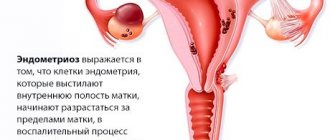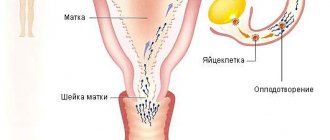As a rule, a woman becomes fertile when she menstruates. Regular bleeding occurs once every 21 to 35 days. The cycle begins with the follicular phase, during which the unfertilized egg leaves the female body along with exfoliated endometrium and blood. Then a new egg is born and matures and the luteal phase begins, preparing the uterus for successful implantation of the fertilized egg.
If the egg does not meet the sperm, progesterone levels drop. Against the background of changes, the blood vessels of the endometrium narrow, and it begins to be rejected with blood. After menstruation, the cycle begins again. However, pregnancy does not always depend on menstruation. Ovulation plays a major role in conceiving a child. In some cases, a woman manages to become pregnant even without a previous menstruation.
Is it possible to get pregnant without menstruation: information for nursing mothers
Considering the question of whether it is possible to get pregnant without menstruation, let’s immediately talk about lactation. There are no periods during breastfeeding, but a large number of unplanned pregnancies occur during this period.
After childbirth, a woman’s reproductive system gradually recovers. But during lactation, the body intensively produces prolactin. The hormone suppresses estrogen synthesis and prevents egg maturation.
Prolactin dominates as long as the baby is fed exclusively breast milk. As complementary foods are introduced, the amount of maternal product decreases and less prolactin is produced. Under such conditions, estrogen levels increase. Having reached a certain point, the hormone starts the process of egg maturation.
If conception does not take place, the unfertilized egg and the unnecessary endometrium provoke the appearance of the first postpartum menstruation. Bleeding may be irregular at first. Delays of 1–2 months are allowed.
Thus, the answer to the question of whether it will be possible to get pregnant after childbirth without menstruation is obvious. If after childbirth the first mature egg was immediately fertilized by sperm, menstruation will not begin. A new pregnancy will definitely occur. Therefore, in the postpartum period, you should carefully protect yourself, and when planning a family, decide how soon you need another child.
It is necessary to take special precautions after a caesarean section. A woman is prohibited from becoming pregnant unnaturally for 2–3 years after the birth of a child. Early conception is dangerous due to suture dehiscence and the development of complications.
Conditions necessary for conception
Every month, a woman’s body prepares for the fertilization of an egg and the further bearing of a child. Let's consider what changes occur in the reproductive organs during the menstrual cycle of standard duration (28 days).
| Period | Cycle days | Changes taking place |
| I (follicular) phase | 1-14 | The phase begins with menstruation, during which the egg, unfertilized in the previous cycle, is released along with the exfoliated endometrium. Under the influence of estrogen, a new egg matures in the ovaries, and the endometrium thickens. |
| Ovulation | 14-16 | Estrogen levels peak, which promotes the production of luteinizing hormone (LH). The mature follicle ruptures and the egg leaves the ovary. The corpus luteum (ruptured follicle) actively synthesizes progesterone. Only during this period is fertilization possible. |
| II (luteal) phase | 14-28 | The production of LH in large quantities promotes the synthesis of progesterone, under the influence of which the endometrium becomes loose, which is necessary for the successful implantation of a fertilized egg. If fertilization does not occur, then the level of progesterone drops, as a result of which the blood vessels in the endometrium narrow, and it is rejected, and menstruation begins. The cycle repeats again. |
If the menstrual cycle is regular and ovulation occurs in the middle, which is confirmed by data from special tests and basal temperature, then unwanted pregnancy should be protected on days when the probability of conception is high (8-16 days). It is also worth considering the fact that sperm live in a woman’s genital tract for up to 7 days. A possible disruption of the monthly cycle can lead to a delay in the ovulation date.
Many people mistakenly believe that the fact of the onset of menstruation is the main sign of the normal functioning of a woman’s reproductive system. However, ovulation plays a key role in conception. Therefore, in some cases, pregnancy occurs without previous menstruation.
Pregnancy in teenagers and menopausal women
A girl can have her first period at 8–9 years of age. In most cases, the onset of menarche occurs between the ages of 11 and 16 years.
If there is a delay in sexual development, when menstruation begins after 17 years, and if menstruation is too early, pregnancy may occur. If a girl is sexually active, unprotected sex at the very first ovulation will lead to conception.
Adult women who have entered menopause are also at risk of becoming pregnant. In the absence of menstruation for several cycles, women lose their vigilance and stop using protection, not thinking about the possibility of getting pregnant.
If you haven’t had your period for a long time, but unprotected sexual intercourse occurred and coincided with sudden ovulation, this will end in fertilization of the egg. Therefore, you should not rely on a long absence of menstruation during premenopause - pregnancy can occur at any time. But it is unlikely that a woman over 40 will find her desirable.
Remember that ovulation always precedes menstrual bleeding. Unprotected sexual intercourse at the moment of release of a mature egg from the follicle is fraught with unplanned pregnancy. Even if you are tracking and know the date of ovulation, do not forget that the cycle can be disrupted for various reasons. As a result, the egg will leave its shell another day.
Pregnancy without menstruation: other situations
When studying the topic of whether it is possible to get pregnant without menstruation, it is necessary to mention those situations that are not related to lactation, menarche and menopause. Among the factors that affect the menstrual cycle, experts note:
- Stress.
- Excess weight.
- Endocrine pathologies.
- Incorrect use of hormonal contraceptives.
- Treatment with hormonal drugs.
- Poor nutrition.
- Diseases of the pelvic organs.
- Hormonal imbalances that shift the date of ovulation to another time.
Considering all of the above and understanding that at a certain stage of life pregnancy is not necessary, you need to take care of choosing a suitable contraceptive
Amenorrhea and pregnancy
The presence of regular ovulation and menstrual bleeding depends on a variety of factors, ranging from stress and poor nutrition to serious illnesses. If the delay lasts six months, the patient is diagnosed with amenorrhea.
This condition is classified as follows:
- Natural amenorrhea - manifests itself in menopause, during pregnancy and breastfeeding, before full puberty.
- Pathological - with primary amenorrhea, signs of puberty and menstruation are absent after 16 years; with secondary amenorrhea, a long delay is observed with a previously established cycle. Occurs in diseases of the reproductive system and after gynecological operations.
- True – divided into physiological and pathological. In the first case, there is neither ovulation nor menstruation. Pregnancy cannot occur under such conditions. In the second case, amenorrhea is associated with obesity, anorexia, endocrine disorders, gynecological and other diseases.
- False - develops with congenital malformations of the genital organs and their complete absence.
When asked whether it is possible to get pregnant if there are no periods at all, doctors answer positively when the patient is diagnosed with natural amenorrhea. Despite the pathology of the situation, the mature egg manages to be fertilized before the onset of menstruation.
About contraception
Girls and women who are sexually active, but do not plan to have children, should be protected on all days of the menstrual cycle, and during menstruation too. Ovulation can occur either in the middle of the cycle, or at the beginning or at the end.
Mothers should discuss the topic of contraception with their daughters even before menarche.
It is better not to use hormonal contraceptives during puberty so that they do not disrupt the natural processes of the body. It is optimal for young girls to use condoms, which protect both from conception and from sexually transmitted infections.
Women who have given birth can protect themselves from unplanned pregnancy in different ways. For some, local contraceptives will be suitable, while others will limit themselves to condoms or have an intrauterine device installed. Hormonal medications are contraindicated during breastfeeding.
During menopause, women are also not recommended to take contraceptives containing hormones. If you are sexually active, it is better to put in an IUD or continue to use special creams, tablets, and condoms.
Useful video for women and men:
Menstruation occurring monthly at approximately the same time indicates the normal functioning of the body of a woman of reproductive age. Every month, an egg matures in the female body, and the menstrual cycle ends with menstrual bleeding or pregnancy.
Pregnancy can occur when a man's sperm reaches a mature egg released from the ovary and connects with it. Pregnancy is impossible without ovulation. Can it happen if there is no menstruation?
Reasons for lack of menstruation
The menstrual cycle is regulated by hormones. Any changes in hormonal levels may change the cycle itself. Menstruation may become longer or shorter, be abundant or scanty, or may be completely absent.
Among the main reasons for the absence of critical days are the following:
- severe stress. Stressful situations cause hormonal imbalances, for example, the hormone responsible for the normal course of menstruation may be produced in insufficient quantities;
- past illnesses (flu, colds);
- change in lifestyle, change of place of residence;
- treatment with certain drugs (side effect);
- sudden weight loss or weight gain;
- the first months after childbirth, especially when breastfeeding the baby;
- menopause. Menstruation becomes irregular and gradually stops.
There may also be pathological reasons for the absence of menstruation in the fair sex. So, if critical days do not come within 3-4 months, this is called amenorrhea. If the absence of menstrual bleeding is associated with malfunctions in the woman’s reproductive system, we are talking about true amenorrhea. In the nursery, the egg matures, and ovulation occurs, but there are also pathological processes, we can talk about false amenorrhea. In this case, menstruation may be absent, but there is a possibility of pregnancy. However, there is no guarantee that it will proceed normally and will persist.
Pathological amenorrhea
The absence of non-physiological regulations for more than 6 months is a pathological manifestation of amenorrhea. It happens:
- Primary – there are no signs of puberty (female hair growth, enlargement of the mammary glands) and menstruation at 14 years of age, with no menstruation by 16 years of age.
- Secondary - in the absence of regulation for more than six months, if before that they were present, but stopped.
In addition, true and false amenorrhea are distinguished. Causes of false amenorrhea:
- Congenital anomalies (atresia or fusion of the vagina, cervix, hymen).
- Congenital absence of an organ.
In these cases, the ovaries perform their functions, ovulation occurs, but the flow of blood and exfoliated epithelium is hampered due to obstacles caused by developmental abnormalities.
True amenorrhea is the absence of menstruation and ovulation. Pregnancy cannot occur. The physiological absence of regulation can also become a manifestation of true amenorrhea, we discussed it above.
Pathological true amenorrhea is caused by:
- Diseases of the endocrine system.
- Diseases of the nervous system.
- Pathologies of the brain (pituitary gland, hypothalamus).
- Obesity, anorexia.
- Physical activity, stress.
- Chronic poisoning with phosphorus and heavy metals.
- Gynecological pathology.
A large number of gynecological diseases and complications after surgery can lead to secondary amenorrhea. Eg:
- Acute infectious processes.
- Diseases of the ovaries (tumors, polycystic disease, etc.).
- Hormonal dysfunctions.
- Tuberculosis of the genital organs.
- Abortions, operations on the uterus, cicatricial fusion of the vagina, cervical canal (false secondary).
- Removal of the uterus and/or ovaries.
All these problems require intervention and supervision from a qualified specialist; do not refuse a visit to the gynecologist.
Possibility of conceiving after the birth of a child
Not all women experience a long period without menstruation after childbirth. When breastfeeding, this period will be longer. The thing is that the hormone prolactin (produced during the formation of breast milk) prevents the release of estrogen, which is responsible for egg maturation, ovulation and conception. When the effect of prolactin becomes less effective, estrogen production is restored. This happens when the baby is introduced to complementary foods and the number of breastfeeding decreases.
A woman cannot determine exactly when the menstrual cycle will resume. If ovulation occurs and there is sexual intercourse, there is a possibility of pregnancy without menstruation. If you don't have your period, can you get pregnant? The critical days will not begin, because you can get pregnant a second time. This is why the lactation method is considered a rather risky method of contraception. You can get pregnant within a month after giving birth. But, you need to understand that the body needs to be given time to recover, which is why the issue of contraception after childbirth is so important.
Phases of menopause development
The reproductive period of a woman's life begins with the first ovulation and ends with the cessation of regular menstruation. The process of loss of fertility is called menopause. It is divided into the following stages:
- Perimenopause. The duration of the phase is about five years. Occurs four years before the last menstruation. The moment of the last critical days is called menopause. The final loss of reproductive function usually occurs after the half-century anniversary.
- Postmenopause. Follows perimenopause and lasts until the end of life. Characterized by estrogen deficiency, leading to unpleasant symptoms:
- hot flashes;
- night sweats;
- irritability;
- blood pressure surges;
- tachycardia;
- insomnia;
- migraine;
- dizziness;
- imbalance;
- loss of libido;
- vaginal itching;
- absent-mindedness.
These symptoms worsen after menopause. Then they fade away. But bone loss begins, and vascular elasticity is impaired. Osteoporosis develops, bones become brittle and break easily. Vascular diseases occur.
The possibility of conception without menstruation in girls
Is it possible to get pregnant without periods during puberty? Menstruation begins in girls at approximately 11-15 years of age. It is believed that the girl’s body is already ready for pregnancy, because the egg is already maturing in the ovaries every month. If a girl begins menstruation before this age, this indicates early puberty.
But it may also be that menstruation is absent at the age of 16 and 17, while the girl is fully developed physically. Is it possible to get pregnant if you don't have periods? The girl is already sexually active, although she does not have periods, so she does not know when the egg will mature in her body and ovulation will occur. In other words, conception can occur during puberty even if there is no menstruation.
Probability of pregnancy during menopause
Often women who have entered menopause believe that since they do not have periods, they can no longer become pregnant in the absence of critical days. This opinion leads to the fact that pregnancy becomes a real surprise, and not always a pleasant one.
Of course, pregnancy in the absence of monthly bleeding during menopause is an uncommon occurrence, because the eggs mostly no longer have the necessary maturity.
The pregnant period during menopause can come with certain difficulties and have possible risks for both the woman and the child. Therefore, every woman must decide consciously whether to give birth or not.
Is it possible to get pregnant during menopause?
- Perimenopause precedes the end of menstruation. It occurs on average at 45 years of age and lasts about 3-7 years. At this time, changes in the cycle occur, the interval between menstruation increases, and they themselves become scanty or, conversely, too abundant. At this stage of life, the ovaries, although in small quantities and not every month, still grow follicles.
- Menopause lasts about 12 months after the last bleeding, the woman’s age at this moment is approximately 50-51 years. Theoretically, the egg should no longer develop, but when assessing whether it is possible to get pregnant during menopause if you have not had periods for 1 year, it is impossible to give a definitive negative answer. It is believed that if there are no critical days for more than a year, pregnancy does not occur due to the fact that there is no development of follicles. But it is quite possible that the egg will appear unexpectedly. Therefore, some experts recommend using contraception for 5 years from the date of your last menstruation.
- Postmenopause lasts until the ovaries stop working completely, that is, until the end of life.
Menopause is usually divided into three age stages with different periods of time
Contraception methods
Pregnancy can occur on any day of the menstrual cycle, even during menstruation. Ovulation can occur not only in the middle of the cycle, but also at the beginning or end. It is for this reason that, unless, of course, pregnancy is desired, you need to take precautions.
You need to talk about contraceptive methods with the girl even before her period begins. And to choose the best remedy, it is advisable to consult a gynecologist.
It is better not to use hormonal contraceptives during puberty. The body is already undergoing serious hormonal changes, and such drugs can create an even greater imbalance.
The best method for protecting against unwanted pregnancy in adolescence is condoms. This is an effective protection not only against unwanted conception, but also against many sexually transmitted infections.
After childbirth, you also need to protect yourself from possible pregnancy. To do this, you can use both condoms and topical agents (vaginal creams, gels, tablets). Hormonal contraceptives are contraindicated during lactation.
Hormonal contraceptives are also not suitable for menopausal women. If sexual activity remains active, an IUD is inserted; you can also use condoms, vaginal tablets or creams.
If amenorrhea occurs, only a gynecologist should select contraceptives, as in all other cases.
We can conclude that even in the absence of menstruation, a woman may well become pregnant. Throughout life, the menstrual cycle can sometimes malfunction; menstruation for physiological reasons may even be absent, but if ovulation occurs, then the ability to conceive exists. However, if there is no menstruation for a long period, you should definitely consult a gynecologist. This is not a normal condition that requires immediate determination of the cause and normalization of the menstrual cycle.
Menopause is a period in the life of every woman, which notifies that some changes have occurred that affect many functions of the body, including reproductive ones. Not everything is so simple, and even stopping menstruation sometimes does not guarantee that you will not be able to conceive. Is it possible to get pregnant during menopause if you don’t have periods? This is a question that no doctor can answer with certainty, and we’ll try to figure out the reasons for this.
Contraception in the absence of menstruation
They are starting to talk about methods of protection within the walls of schools. When a gynecologist comes to extracurricular lessons. Then they are selected based on the characteristics of the body and personal preferences.
- During puberty, it is not advisable to take hormonal contraceptives. Protection should be less aggressive. The best method of protection is using a condom. Its use will not only prevent unwanted pregnancy, but also protect against PPP diseases. You need to talk to girls about how to get pregnant from the age of 8. Just choose the right form of explanation. The modern generation is characterized by rapid puberty.
- After childbirth, feeding will be able to fully protect the female body from re-pregnancy for about 5 weeks. The risk of becoming pregnant increases with each month. The maturation of the egg can occur at any time. Although the cycle will be fully restored 6 months after birth. Protection should be in the form of a condom. Or local contraception, for example, vaginal tablets, gels, creams. Taking hormonal medications is completely contraindicated while breastfeeding. 3-4 months after birth, you can put in a contraceptive device. However, with its presence, the cycle will begin to recover faster. Menstrual blood will appear. Such transformations will lead to changes in the taste and smell of milk. The child may refuse to feed.
- As for women during menopause, contraception with hormonal pills is not entirely convenient. During active sexual activity, a contraceptive device is inserted, condoms, cream or vaginal pills are used.
- If amenorrhea is present, contraception is selected by the attending physician on an individual basis. Because the causes of pathology and the condition of the body should be taken into account.
Interesting video:
Pregnancy brings joy, new hopes, and completely changes your life. But all this happens when she is desired. To avoid trouble, you must always remember about contraception and be “on guard”! An irregular cycle and lack of menstruation can present both a pleasant and not entirely welcome surprise.
Menopause is a period in the life of every woman, which notifies that some changes have occurred that affect many functions of the body, including reproductive ones. Not everything is so simple, and even stopping menstruation sometimes does not guarantee that you will not be able to conceive. Is it possible to get pregnant during menopause if you don’t have periods? This is a question that no doctor can answer with certainty, and we’ll try to figure out the reasons for this.
Will you be able to conceive if you haven’t had your period for 6 months?
Reproductive function in the fairer sex usually begins to fade by the age of 45-50. You can notice this by your periods, which become short-lived and their regularity is disrupted. After 1-3 years they stop altogether, and for many women the question remains: is it possible to get pregnant during menopause if there are no periods?
Before drawing any conclusions, you need to understand what is happening in the body at this time. The main participant in successful conception is the egg, and during the period when changes take place, it also does not stand aside, matures irregularly and it is quite difficult to predict this process. That is why, if there are no periods for 6 months, one should not say with confidence that conception is impossible - the functions of the egg do not complete during this period, although there are some violations.
We should not forget that menstruation during menopause may be delayed for several months, and it is not surprising if it suddenly happens. You don’t have to be surprised by conception, which can happen suddenly, because even a doctor will not be able to predict the maturation of the egg at this time.
I haven’t had my period for a year now – is there a chance of getting pregnant?
If you ask an experienced doctor whether it is possible to get pregnant during menopause if there are no periods, he will not be able to answer accurately, because the female body has always been famous for its surprises. Unexpected conception, and a long time after the last menstruation, is also far from an exception to the rule, but a common event that can be prepared by an unpredictable egg.
Is it possible to conceive if you haven’t had your period for a year? We should not forget that in a woman’s body, the genital organs take a long time to adjust to changing the functions of the processes inherent in nature, so there is no need to hope that pregnancy is completely excluded. Moreover, it is still too early to relax - you need to protect yourself for a long time, especially if adding to your family is no longer desirable.
Even a year after your last menstruation, you need to carefully monitor your health and well-being. Often, women mistake the first signs of pregnancy for symptoms of menopause, which they will later have to repent of - conception has already occurred, and all that remains is to decide what to do next, give birth or go for an abortion, which may be too late.
Is pregnancy possible during menopause?
At this time, you need to especially carefully monitor your condition. After all, the situation can be complicated by the fact that against the background of irregular menstruation, one may not notice the onset of pregnancy, and its signs may be mistaken for the development of a pathological syndrome. Hence the conclusion: during premenopause there is a high probability of conception. Especially if reproductive activity has not previously been aggravated by any diseases or malfunctions. Read about how to distinguish pregnancy from menopause.
Interesting: Is it worth getting a flu shot in kindergarten, reviews from parents
No periods for two years - is it possible to get pregnant?
How high is the risk of conceiving a child if you have not had a period for two years? More intense changes occur in the body, and they affect not only the psychological state, but also the internal organs. The ovaries also lose activity and slowly subside, practically not producing follicles; connective tissue forms in their place.
The uterus also undergoes changes:
- it decreases several times in size;
- the patency of the fallopian tubes decreases;
- the endometrium atrophies;
- the length of the uterine tubes is shortened.
Ovulation is almost completely completed, which leads to the complete cessation of menstruation. Despite this, the risk of conception remains, so it is too early to abandon birth control. Even if the last discharge was more than two years ago, there is one chance in tens of thousands that the uterus prepared an unexpected surprise and retained some of its functions directly related to fertilization.
Is it possible to have a baby if you haven’t had periods for 4 years?
Another problem that worries the fairer sex is whether a child can appear in the family if there have been no periods for 4 years. Doctors say that the probability of this is close to zero, especially in old age. Despite this, doctors do not recommend giving up birth control before visiting a gynecologist. Only a doctor can determine how much the internal organs have changed and whether certain surprises remain in them.
There are many women who, even after so much time after their last menstruation, dream of bearing a baby. Do they have the opportunity to conceive? If just recently this seemed almost impossible, today it is quite possible, because medicine does not stand still and new discoveries occur every year. Now, a short course of medication can restore reproductive function, although donor eggs are most often used.
Even if old age is not an obstacle to bearing a child, it is recommended to visit a gynecologist. Only a thorough examination will help determine exactly what changes have occurred in a woman’s internal organs, whether it is possible to activate their work, or whether drastic measures should be taken.
Is it possible to get pregnant at 48-50 years old?
You can talk with confidence about whether it is possible to get pregnant at 48-50 years old only after a visit to a gynecologist, who will be able to determine how much the internal organs responsible for reproduction have changed at this age. If your periods are stable and regular, there are no significant changes, then it is quite possible that you will be able to conceive and even carry a baby to term without any difficulties. Of course, all this should happen only under the strict supervision of doctors.
What should you do if you decided to get pregnant at this age, and your periods have only recently disappeared? You should not delay your visit to the doctor - it is quite possible that you will be able to induce menstruation by taking special medications. To do this, the doctor may prescribe a course of pills:
- Divitren;
- Cliogest;
- Cyclo-proginova;
- Estrovel;
- Feminal.
The only rule in this case is to carry out the appointment only after agreement with the doctor. Dosage, duration of the course, additional measures as folk formulations - all this should be decided only by a physician.
Late labor
Pregnancy during menopause occurs against the background of hormonal changes, and therefore poses a danger to the child and mother for the following reasons:
- There is a high probability of having a baby with impaired physical and intellectual development.
- An elderly body is not able to ensure the full development of the embryo. During menopause, you can become pregnant and cause irreparable damage to your own health.
- The processes of bone texture degradation are activated. Teeth are destroyed.
- The kidneys and genitourinary organs suffer.
- There is a danger of developing diabetes, hypertension, and chronic diseases.
- The risk of miscarriage and ectopic pregnancy increases.
- Labor is dangerous. Ruptures of the birth canal are possible, and the risk of bleeding is high.
Not having children doesn't mean you can't have them. A woman cannot become pregnant at the optimal time for the following reasons:
- Material disadvantage.
- Studies. Career.
- Couldn't find a worthy partner.
- Diseases.
An unexpected pregnancy during menopause is a reason to contact a gynecologist. At the consultation, a decision is made: abortion or continuation of the pregnancy. Both options pose health risks.
There comes a time in the life of a childless woman when a burning desire to be a mother appears. Gynecologists note the following positive aspects of late childbirth:
- A mature woman conscientiously takes care of her health.
- Pregnancy rejuvenates the body.
- The mother's financial situation allows her to raise her child.
It is contraindicated to give birth during menopause for the following reasons:
- Bad habits.
- Chronic diseases.
- Complications of pregnant women - anemia, severe edema, hypertension.
- Risk of miscarriage.
- Ectopic (ectopic) pregnancy.
- Pathology of the cervix, ICN. Observed in those who have had many abortions.
The probability of conceiving at 55 years old - how high?
Ladies aged 55 also often wonder: is it possible to get pregnant at that age? Doctors assure that if menstruation has not yet ended, although it occurs irregularly and infrequently, then the risk of conception is still quite high, so you should not give up contraception. If you no longer have periods, and for several years, then, most likely, pregnancy will no longer occur.
Is it possible to do anything if even age does not become an obstacle to the desire to have a child? Only a doctor can determine this, and you should go to him for a consultation. If there is a slight possibility of becoming pregnant, the doctor will prescribe treatment that will help restore reproductive function. If the internal genital organs responsible for reproduction have already completely atrophied and ovulation does not occur, you will most likely have to decide on donation or give up the dream of having a baby.
You can increase the effectiveness of treatment with herbal compositions - some herbs have the ability to restore the functions of the uterus. The only requirement for this is to first consult with a doctor, who will recommend the most effective formulations. Usually they are taken in combination with pharmaceutical drugs - the likelihood of getting pregnant increases several times.
Menstruation indicates the normal functioning of the female body. Hormonal changes and the complex mechanism of egg maturation occur every month. The menstrual cycle ends with menstruation or pregnancy. This picture indicates that ovulation occurs in the middle of the cycle and the woman is ready to conceive. At the same time, the question is often asked: “Is it possible to get pregnant without menstruation?” The answer is both “Yes” and “No”. It all depends on the reasons for the lack of menstrual bleeding.
Interesting stories about how underage teenagers and older women give birth never cease to shock the public. They are shown on the news and filmed on TV. Because this phenomenon is considered rare. At this age, there are no periods, which means there should be no pregnancy.
During puberty
Normally, women begin menstruation between the ages of 8 and 15. From this moment on, it is believed that the female body, in principle, can become pregnant. The egg matures. If menstruation occurs before this age, they speak of early puberty. However, it also happens that menstruation is absent at 17 and 18 years old. At the same time, the girl is physically formed and meets the criteria for her age. At one point, the egg will mature and ovulate in the middle of the cycle. The girl doesn’t know exactly when this will be. At the same time, there is a sexual life. It turns out that she can get pregnant without menstruation. That is, during puberty without menstruation, conception can occur.
In the absence of menstruation during menopause
At a certain point, a cycle restructuring begins to occur again in the female body. However, we are already talking about stopping menstruation. At the age of 45, women begin menopause. Theoretically, no egg is released, no ovulation, no menstruation. Conception also cannot occur. However, numerous examples where a woman gives birth at 55 or 60 years old indicate the opposite. The situation is similar to the first case. The female body is completely unpredictable. After a long absence of menstruation, ovulation will occur. If there is sexual intercourse during the cycle, conception will occur.
Pregnancy without periods after childbirth
A prolonged absence of menstruation may not please every woman. Only those who are breastfeeding. The feeding period takes from 6 to 12 months. When breast milk is formed, the milk hormone prolactin is produced. It prevents the release of the female hormone estrogen, which is responsible for the development of the egg, the onset of ovulation and conception. With the introduction of complementary foods, at approximately 6 months, the amount of milk decreases. Consequently, prolactin becomes less effective. Estrogen production resumes after childbirth. A woman cannot accurately determine the moment of resumption of her monthly cycle. Ovulation will occur, and if there is intercourse, conception will occur. And your period never comes. Breastfeeding is considered a method of birth control. But very risky. You can get pregnant a month after giving birth.
Pregnancy without menstruation due to pathologies
The absence of menstruation for 3-4 months is called amenorrhea in medicine. In this case, a distinction is made between true and false amenorrhea. In the first case, due to improper functioning of the reproductive system. In the second case, pathological processes are present, but the egg matures, ovulation is present. There is no bleeding, which is usually called menstruation. Conception will occur, pregnancy will occur. The only question is how it will proceed further and whether the egg will remain in normal condition.
In addition, pregnancy without menstruation can occur when the cycle is restored, taking hormonal medications, excess weight, or endocrine diseases.
Modern medicine never ceases to declare that you can get pregnant on any day of the cycle, even during menstruation. Ovulation can occur at the beginning of the cycle or at the end. Eggs can mature 2. Therefore, in any case, protection should be present if there is no desire to get pregnant.
Amenorrhea: causes and consequences
If the frequency of menstruation decreases to six months, gynecologists talk about oligomenorrhea. If menstruation is absent for a year or more, then true or false amenorrhea is implied. In turn, true amenorrhea is divided into physiological and pathological (primary, secondary). There may be several reasons for this disease:
- pregnancy, lactation, adolescence and childhood, postmenopausal period (physiological natural causes);
- anatomical reasons: absent or underdeveloped internal pelvic organs, androgenization (mutations);
- absence of perforations in the hymen (primary amenorrhea);
- infectious lesion of the uterus (more often – pelvic tuberculosis);
- Asherman's syndrome (excessive curettage of the uterine cavity after miscarriage, abortion, after multiple abortions);
- endocrine hormonal diseases;
- decreased production of the hormone Gn-RH (congenital anomaly);
- dysfunction of the hypothalamus and pituitary gland;
- gonadal dysgenesis due to chromosomal abnormalities (insufficient synthesis of steroid hormones by the ovaries);
- premature depletion of primordial oocytes (no eggs are produced).
The consequences of missing menstruation for a woman depend on the real reasons. If there is a genetic mutation, then it is impossible to talk about pregnancy. But, in some cases, if stable menstruation was previously observed, and now they are irregular or absent altogether, we are talking about an inflammatory process, infection, or hormonal disorders.
The period of puberty is on average indicated by the age of girls from 12 to 18 years. During this time, in addition to the maturation of the reproductive system, the physiological development of the entire organism is completed: the physique and ossification of the growth zones of tubular-type bones are formed.









